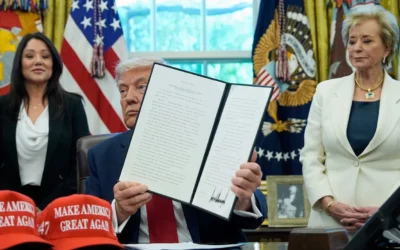Trump’s Accusations: A Closer Look
In a series of startling comments this week, former President Donald Trump has publicly accused Ukrainian President Volodymyr Zelensky of undermining a potential U.S.-brokered peace plan for Ukraine, especially amid the ongoing conflict over Crimea. Trump asserted that the peace deal with Russia is closer than many believe but contended that Zelensky’s actions are slowing the progress. These remarks come as the U.S. maintains a complex stance on the war in Ukraine and its relations with both Kyiv and Moscow.
A History of Relations
The relationship between the U.S., Ukraine, and Russia has been historically tense, particularly since Russia annexed Crimea in 2014. Under Trump’s administration, a controversial phone call between him and Zelensky became a focal point of his first impeachment, with allegations of Trump pressuring Ukraine to investigate his political rival, Joe Biden.
Now, as the war escalates, Trump’s recent statements appear to be an attempt to shift responsibility for the stalled negotiations away from Russia and place it squarely on Ukraine’s shoulders. This rhetoric raises questions about the motivations behind it and whether it can indeed be taken at face value.
Trump’s Claims on Peace Talks
During a recent press event, Trump expressed his belief that a peace deal between Ukraine and Russia is on the verge of being finalized. He suggested that Zelensky, by not cooperating fully, is jeopardizing this opportunity. Trump stated, “Zelensky has no cards to play and he’s ruining what could be a tremendous deal for the world.” These comments have ignited debates over whether they reflect an informed perspective or are simply a continuation of Trump’s controversial foreign policy posturing.
Reactions from Officials
The response from U.S. officials and the Ukrainian government has been mixed. Many in Washington are wary of Trump’s claims, arguing that they oversimplify a complex situation while undermining Ukraine’s sovereignty. John Kirby, spokesperson for the National Security Council, stated, “This is a time of war. It is critical that Ukraine has the support it needs to defend itself against unprovoked aggression from Russia. To suggest otherwise misrepresents the realities of this crisis.”
In Ukraine, top officials have reacted with skepticism. Ukrainian Foreign Minister Dmytro Kuleba stressed that the only way to achieve a lasting peace is through Russia’s withdrawal from occupied territories. Kuleba mentioned, “Peace can only be achieved once Russia recognizes Ukraine’s borders and stops its military aggression.”
The Importance of Diplomatic Efforts
Diplomatic channels remain crucial in navigating the conflict. It’s essential for the U.S. administration to maintain a balanced approach that supports Ukraine while also exploring avenues for peace. Washington’s strategy has involved sanctions on Russia, military aid to Ukraine, and dialogues with European allies to bolster collective security.
China’s Role and Economic Ramifications
As the geopolitical climate shifts, the role of China becomes increasingly significant. Trump has also shown interest in the dynamics of U.S.-China relations, including tariffs and economic strategies. With China being a major global player and ally to Russia, its actions can directly impact the situation in Ukraine.
Trump’s comments on tariffs and trade policies are part of a broader narrative that seeks to reframe America’s position on international trade. The former president argues that robust economic measures against China are necessary for national security and to send a message to adversaries like Russia. This dual focus on both Ukraine and China is indicative of a more expansive view of U.S. foreign policy challenges.
Public Perception and Media Coverage
Trump’s remarks have prompted media outlets to analyze public sentiment related to the Ukraine conflict and U.S. involvement. Polls suggest that Americans remain conflicted over the extent of military support to Ukraine. While there is substantial backing for aiding the nation against Russian aggression, a sizeable portion of the public expresses concern about the potential costs and ramifications of deepening involvement.
Media coverage of Trump’s statements has varied, with some outlets focusing on his significant influence within the Republican Party, a crucial factor as the 2024 presidential campaign looms. Trump’s base remains largely supportive of him, interpreting his comments through a lens of America First nationalism, which emphasizes U.S. interests as paramount.
The Road Ahead
As the conflict in Ukraine continues, the dialogue surrounding peace negotiations, U.S. foreign policy, and the influences of former leaders like Trump will remain pertinent. The upcoming elections will likely place these issues at the forefront, inviting a renewed debate on America’s role in international conflicts and the strategies required to maintain global stability.
In summary, Trump’s allegations against Zelensky will resonate through the political landscape as candidates and officials weigh the implications of Trump’s commentary. Whether viewed as sabotage or strategic insight, the former president’s influence persists as a significant factor in shaping public discourse on the Ukraine war and U.S. foreign policy moving forward.
Conclusion
The situation in Ukraine is fraught with complexity and urgency. Trump’s remarks introduce another layer to an already complicated narrative. As both the U.S. and allied nations reevaluate their strategies amidst ongoing conflict, understanding the interplay between self-interest, foreign policy, and the quest for diplomatic solutions will be instrumental in navigating the future of U.S.-Ukraine relations.







